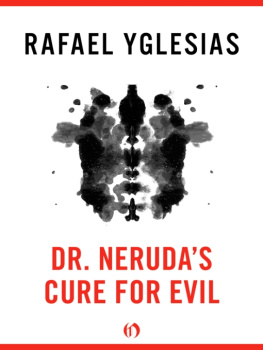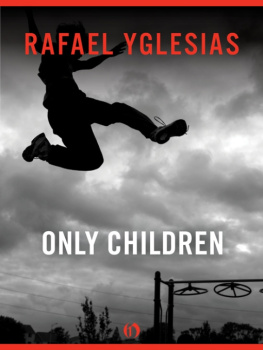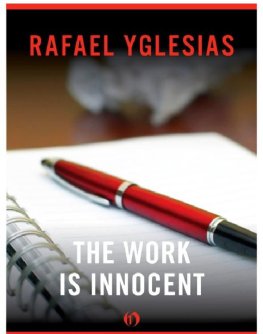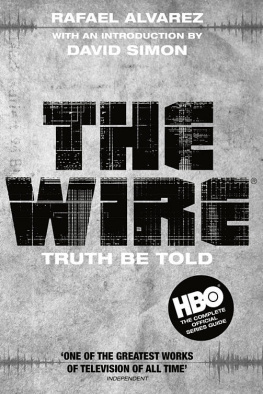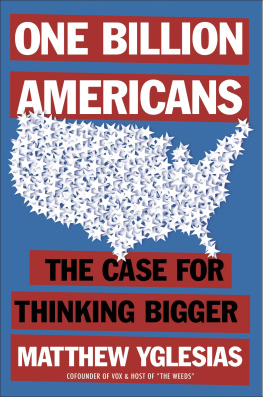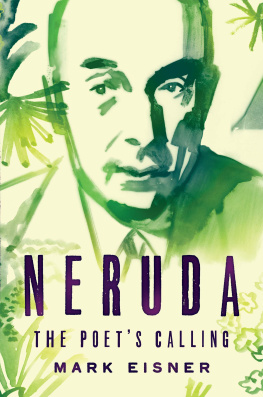Rafael Yglesias - Dr. Nerudas Cure for Evil
Here you can read online Rafael Yglesias - Dr. Nerudas Cure for Evil full text of the book (entire story) in english for free. Download pdf and epub, get meaning, cover and reviews about this ebook. year: 1998, publisher: Grand Central Publishing, genre: Non-fiction. Description of the work, (preface) as well as reviews are available. Best literature library LitArk.com created for fans of good reading and offers a wide selection of genres:
Romance novel
Science fiction
Adventure
Detective
Science
History
Home and family
Prose
Art
Politics
Computer
Non-fiction
Religion
Business
Children
Humor
Choose a favorite category and find really read worthwhile books. Enjoy immersion in the world of imagination, feel the emotions of the characters or learn something new for yourself, make an fascinating discovery.
- Book:Dr. Nerudas Cure for Evil
- Author:
- Publisher:Grand Central Publishing
- Genre:
- Year:1998
- Rating:3 / 5
- Favourites:Add to favourites
- Your mark:
- 60
- 1
- 2
- 3
- 4
- 5
Dr. Nerudas Cure for Evil: summary, description and annotation
We offer to read an annotation, description, summary or preface (depends on what the author of the book "Dr. Nerudas Cure for Evil" wrote himself). If you haven't found the necessary information about the book — write in the comments, we will try to find it.
Dr. Nerudas Cure for Evil — read online for free the complete book (whole text) full work
Below is the text of the book, divided by pages. System saving the place of the last page read, allows you to conveniently read the book "Dr. Nerudas Cure for Evil" online for free, without having to search again every time where you left off. Put a bookmark, and you can go to the page where you finished reading at any time.
Font size:
Interval:
Bookmark:
Dr. Nerudas Cure for Evil
Rafael Yglesias

For the cabal:
Susan Bolotin, Ben Cheever, A. J. Mayer, and Paula Weinstein
Contents
SEALED
This manuscript has been sealed at the request of the author, Rafael Guillermo Neruda, M.D., until fifty (50) years after his death. Authorization from the Director is required for handling. All examination, including for the purpose of preservation or cataloguing, is forbidden
 |  |
Joshua Black | Date |
Victim Psychology &
the Symptomatoloey of Evil

AN OBJECTIVE CASE HISTORY OF:
GENE KENNY AND HIS THERAPIST

by
Rafael Neruda, M.D.
A Note on the Organization of the Text
This study is divided into three parts. Part One is an account, in memoir form, of my own psychological history. Part Two is a case history, covering fifteen years, of one of my patients, Gene Kenny. Part Three is a record of my investigation into the cause of the catastrophic failure of his therapy, the results of that investigation, and my radical alternative treatment.
RAFAEL NERUDA, M.D.
Psychological History
of the
Therapist
CHAPTER ONE
Magic Thoughts
I AM GOING TO PRESENT THESE TWO CASE HISTORIES IN LAYMENS TERMS. Perhaps that will render them useless to psychiatrists and psychologists. It shouldnt. If I have learned anything from the ghastly tragedy I must explain, its that life is lived in laymens terms.
The dirty secret of analysis is that for the collaboration to succeed the doctor has to be gifted. Not only with the ability to decode a patients unconscious. Not only to have an illuminating and healing insight specific to that patients experience of psychological trauma, thus inspiring civil disobedience against his illness. The above are certainly necessaryyet they are insufficient. The therapist must also supply insight at the right moment; when, as it were, the security police are asleep. A talking cure succeeds only partly because it aids self-awareness; most of the work is accomplished through a sensitive and precise management of the healing relationship. What the analyst feels is as crucial as the analysands sorrows. Thus it follows that there is a fatal flaw in all scientifically presented case histories because they are solely concerned with the patients life and character. To understand why the treatment proceeded the way it did one must also know about the doctorhis brilliancies, his mistakes, and his own psychology. The true story of a therapeutic exchange begins not with the patients present problem but with the healers past.
I, Rafael Guillermo Neruda, was born in New York in 1952. My mother, Ruth, was Jewish; my father, Francisco, what sociologists now call Hispanic. For the first eight years of my life we lived in Washington Heights, a working-class neighborhood at the northern extreme of Manhattan. In those days the Heights were predominantly Jewish. So much so, my father had to show the landlord Ruths birth certificate to prove she was Jewish before he was allowed to rent our modest apartment. Although I was accepted by my mothers family, my Jewish friends and their families, they were quick to remind me that I was half alien to them.
I spent summers with my fathers parents in Tampa, Florida. My fathers people were the children of Spanish and Cuban immigrants who moved there in the 1880s to earn their living as cigar-makers. Although my grandparents were American born, they had been raised in an insulated Spanish-speaking ghetto of Tampa called Ybor City (pronounced E-BORE). They spoke English with heavy accents and were distrustful of the white and black Americans who surrounded them. My grandparents were too timid and superstitious to travel to New York, thus I had to be sent down to Ybor City during summer vacation for them to admire and display me to a seemingly endless parade of cousins, aunts and uncles. While summeringbaking would be more accuratewith the Latins of Florida, I was accepted as a beloved object of pride; yet there were frequent reminders that I was half alien to them.
Interestingly, neither the Jews nor the Latins made an overt play for my loyalty. I stress overt. There was one notable exception. Samuel Rabinowitz was seventy-five years old when I was born. My mother was his youngest daughter. She gave birth to me at the age of thirty-six, late in life for a woman of the 1950s. I have a single vivid memory of Papa Sam, an encounter at my Uncle Bernies on the first night of Passover in 1960, in which he claimed me as a Jew and defined my fate. I imbued this event with the magical thinking of a child, a magic that after all became real, because it called into being the ambition of my life.
That morning my mother and I took the train out to Uncle Bernies Great Neck estate to attend the Rabinowitz family Seder. Bernie was Papa Sams oldest son. He was a multimillionaire thanks to real estate ventures that had taken advantage of the postwar boom in New York City for low- and middle-income housing. Bernie possessed the capital for these investments thanks to the profits he made from selling powdered eggs to the government to distribute to our troops during World War II. My uncle was able to make a huge profit because the eggs he powdered for our boys were the rotten throwaways of upstate farmers and thus Bernies only cost was the processing.
By 1960 Uncle Bernie was worth nearly one hundred million dollars. His great wealth was regarded with awe by my mothers side of the family and indeed the worldwith the exception of my mother. The rest of the Rabinowitzes did not agree with my mothers analysis of her brothers moneymaking, namely that Bernie had lived through the best two decades to be in business in American history, that anyone who entered the war years with substantial capital trebled it, that the riskier and more foolish the investment made then, the greater the return. Even if they had shared my mothers interpretation of economic history, my uncles staggering accumulation of wealth beyond the status of mere millionairehood would have convinced them his success was due to more than just good timing. But the abundance did not persuade my strong-willed mother of her brothers genius. Quite the contrary. To her it was a proof of his lack of character. Among many explanations for her attitude I should note that she was a member of the Communist Party. (My training analyst once noted in an ironic mumble, Your family history is a little complicated. Heres another taste of its strange flavor: my father hadnt come with us to the 1960 Seder because he was living in Fidels Cuba, doing research for a book sympathetic to the brand-new revolution. He hoped to help forestall an economic boycott by the U.S., which he believed would soon prove fatal.)
Uncle Bernie was also admired for his generosity and philanthropy. And with good reason. From the age of eighteen on he supported his parents, two brothers and four sisters with direct gifts as well as jobs for them or their spouses. He contributed millions to Israel, Brandeis, two major hospitals, and the Metropolitan Museum of Art. He virtually paid singlehandedly to build a new temple near his mansion in Great Neck. In 1960 and 61, for example, Bernie gave away more than ten million to various charities and causes. All praised him; all believed he was great; except, as noted, for Ruth, my artistic mother, the youngest sibling, and also the only one who did not live off Bernies largess. She refused her brothers offers to employ her freelance husband, just as she had refused years before when Uncle Bernie offered to support her if only she would give up her intention to marry my Latin father.
Next pageFont size:
Interval:
Bookmark:
Similar books «Dr. Nerudas Cure for Evil»
Look at similar books to Dr. Nerudas Cure for Evil. We have selected literature similar in name and meaning in the hope of providing readers with more options to find new, interesting, not yet read works.
Discussion, reviews of the book Dr. Nerudas Cure for Evil and just readers' own opinions. Leave your comments, write what you think about the work, its meaning or the main characters. Specify what exactly you liked and what you didn't like, and why you think so.

